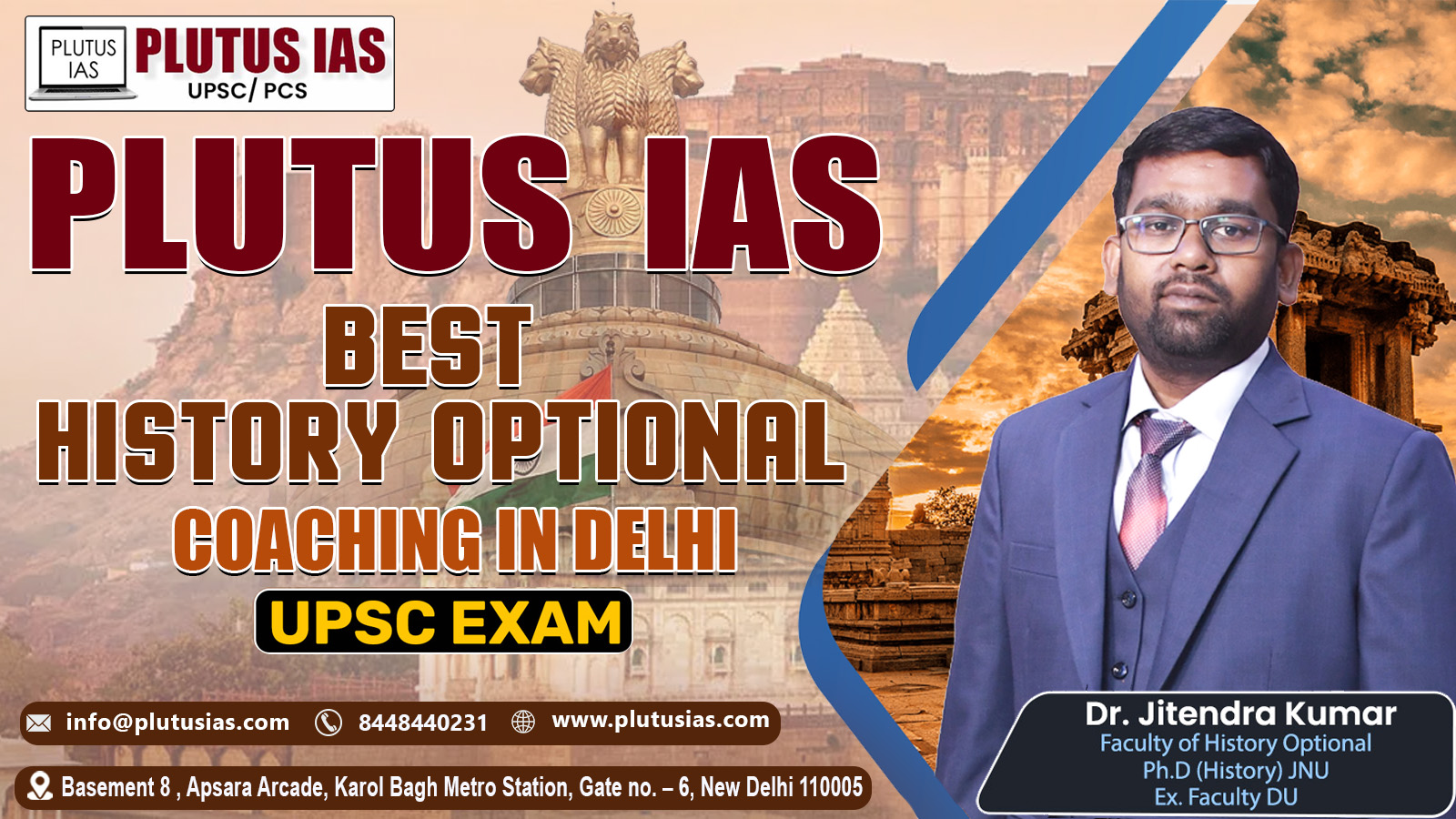History Optional Coaching in Delhi

It aids in understanding not only the past but also how it affects the present and potential future events. In a word, it’s “The Key for Understanding Today.” For UPSC, history is mostly a static elective. Of the 48 courses offered on the UPSC optional subject list, history is one of them. The UPSC history syllabus highly values a candidate’s understanding of historical research methodologies and acquaintance with chronological events. Additionally, it is covered in General Studies Paper 1 for the Mains portion of the IAS Exam. History is unique among the UPSC IAS Exam’s optional subjects. It’s an intriguing subject that teaches us about our past. It is infused with culture and tradition. It is crucial for the UPSC Mains and IAS Prelims exams. The general studies examination and preparatory exams will have fewer questions for candidates who want to pursue history.
Best Teacher for History Optional | Best History Optional Coaching
The Plutus IAS coaching institute features the Best History Optional Teachers like Dr. Jitendra Kumar and more. Sir has been a history instructor for more than five years. Along with a Ph.D. and an M.Phil. in contemporary History from JNU, he also holds an M.A. and a B.A. from Delhi University. In addition, he is a highly qualified and experienced instructor of History Optional. Additionally, Dr. Jitendra Kumar is known for their friendly approach to students. Along with this,
the teaching style of Dr. Jitendra Kumar is Interactive, Test Series, and Notes Giving. Also, Dr. Jitendra Kumar helps students to clear their doubts personally. He also offers the greatest History Optional test series and administers tests regularly as each topic is finished.
Plutus IAS | Best History Optional Coaching in Delhi
Plutus IAS is one of the Best History Optional Coaching in Delhi. Additionally, the Plutus IAS batch size for History Optional is around 40-50 students only. This concise batch size helps to promote interaction between the well-qualified and experienced faculties and History Optional aspirants. Moreover, Plutus IAS has well-qualified and experienced faculties and subject matters like Dr. Jitendra Kumar for History Optional Coaching. Besides, the Plutus IAS coaching center gives classes in all three modes Online, Offline, and Hybrid. Along with this, Plutus IAS provides unlimited access to their online classes till the batch ends. Plutus IAS also provides the best test series for History Optional for their UPSC CSE aspirants.
ONLINE AND HYBRID MODE OF COACHING IN PLUTUS IAS
Dr. Jitendra Kumar is one of the best teachers for History Optional and has a wealth of experience in the History Optional subject. It also provides classes in Online, Offline, and Hybrid methods. Plutus IAS also assists its candidates in achieving their goals through their online classes. Moreover, Plutus IAS Coaching Institute provides unlimited access of their online classes up until the batch ends.
Furthermore, the study guides are current and in line with the UPSC syllabus. Plutus IAS also provides the best optional test series in history in Hybrid mode. Additionally, the coaching institute also provide their History Optional classes through hybrid mode. It allows their aspirants to take classes online and offline according to their flexibility and need.
FEE STRUCTURE OF PLUTUS IAS FOR HISTORY OPTIONAL
Fee Structure of History Optional at Plutus IAS is as follows:
Offline Fee: Rs. 60,000 (Incl. GST)
Online Fee: Rs. 55,000 (Incl. GST)
Hybrid Fee: Rs. 65,000 (Incl. GST)
Plutus IAS | Best History Optional Coaching in Delhi
| Factors | Qualities |
| Faculty | Dr. Jitendra Kumar |
| Batch Size | 40-50 |
| Teaching style at coaching | Interactive, Test Series, Notes Giving |
| Good infrastructure of online facility | Provides unlimited access till the batch ends. |
| Performance of students | Students are well satisfied with the optional subject and cracked the UPSC exam |
| Feedback from past students | The teachers at Plutus IAS are simply the best. with great experience, they teach with the uttermost patience and are always there to clarify doubts. Their class notes are concise and relevant. It is one of the best IAS coaching institutes in Delhi. |
| Offline Fees | Rs. 60,000 (Incl. GST) |
| Online Fees | Rs. 55,000 (Incl. GST) |
| Hybrid Fees | Rs. 65,000 (Incl. GST) |
| Website | Plutus IAS |
| Address | Apsara Arcade, Basement 8 Gate no. – 6, Metro Station, Karol Bagh, New Delhi, Delhi 110005 |
| Phone Number | 8448440231 |
| Mode | Online, Offline, and Hybrid |
History Optional Previous Year Question Papers;
FAQS of History optional
Q. Why should you choose History as an optional?
Q. What should be your plan of preparation regarding History?
Q.How will our History optional course by Dr. Jitendra Kumar help you?
Q.What materials should you refer to?
Q.What are the features of our optional course?
| # | ONLINE FEE | OFFLINE FEE | HYBRID FEE | BATCH STARTS FROM |
|---|---|---|---|---|
| 1 | 55,000/- | 60,000/- | 65,000/- | REGISTRATION – START |



